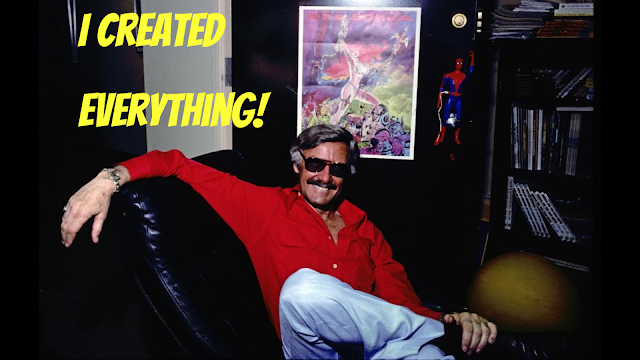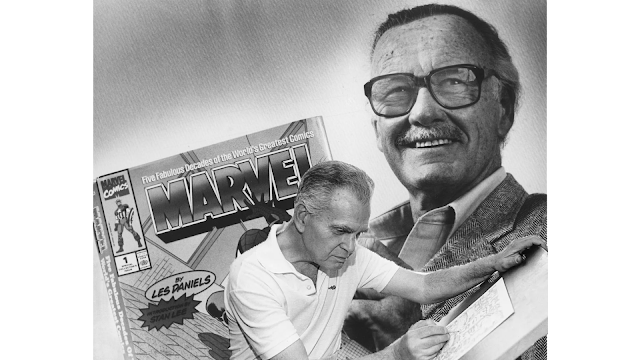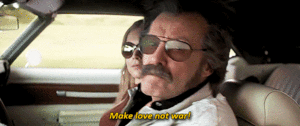As a rule of thumb, I avoid reading other site's reviews prior to writing my own. So, after posting my review of the documentary, Stan Lee: A Marvelous Life that's available for streaming on Disney Plus, I was not so surprised how a few sites reported on a retaliatory response the Kirby Estate, courtesy of Neal Kirby (Jack Kirby's son) who refuted the documentary about the iconic Marvel pitchman, to which Lee came across as self-aggrandizing and very narcissistic.
In "Stan Lee", the writer talks about his many accomplishments while barely mentioning two of his biggest collaborators, Steve Ditko and especially Jack Kirby who came up with the majority of ideas and concepts that Lee has unabashedly taken credit for.
My father Neal Kirby (Jack Kirby’s son) has asked me to post this written statement in response to the Stan Lee documentary released yesterday on Disney+. pic.twitter.com/V4be2xyEJg
— Jillian Kirby (Granddaughter of Jack Kirby) (@Kirby4Heroes) June 17, 2023
Have many of you noticed how Marvel Studio's films for the most part, credits Jack Kirby as Co-creator of Captain America, and not much else during their credit’s rollout?
It's no doubt how Stan was responsible for the comic panel's dialogue, but to my knowledge, Kirby created most of the characters during the era of the Marvel Method collaboration between Lee and him.
It's self-evident when the artist draws the pages while implementing his (Jack's) ideas with Lee filling in the "blanks." Was it Lee who said, "Hey Jack, I have an idea. This big guy whose godlike appearance from space, wants to devour worlds to satisfy his craving, so he dispatches his herald to scout planets, one of them...Earth! It was mostly Kirby's concept among many others like "Him" as in Adam Warlock, The Inhumans and of course, Black Panther. The Fantastic Four comics served as a breeding ground for plenty of Jack's brilliant and bizarre creations that became the foundation for Marvel's worldbuilding. Stan used his zeal, charm and nepotism to promote himself as the "creator" of most ideas when he should have some modicum of grace and gave equal credit to Jack and Steve if not most.
A friend of mine who worked for Marvel at the time, told me that Stan didn't create anything. And he's probably right. Lee was forced to share credit after Ditko stood firm and demanded it. However, the artist was still stripped of receiving any royalties as he was assigned as a "Work for Hire" where all entitlements were removed. This was a very unscrupulous practice that hasn't changed until not too long-ago thanks in part to Rob Liefeld and the founders of Image Comics calling Marvel to task which lead to their exodus from "The House of Ideas.".
Note: When Kirby went off to DC, he created, written and of course illustrated his own titles from New Gods to OMAC, whereas Lee was just an Editor in Chief who passed the torch to Roy Thomas.
Lee may be celebrated as this titan but underneath his "Smiling" guise was a very selfish opportunist. With the recent clapback from Neal, Jillian Kirby and fans like us, perhaps history will be judged more accordingly.
"The 13th century Islamic poet/scholar Rumi said, 'The ego is a veil between humans and God.' In the Disney+ documentary bio of Stan Lee, the veil is lifted. Presented in the first person with Lee's voice providing a running narrative, it is Stan Lee's greatest tribute to himself. The literary expression of ego is the personal pronoun 'I.' Any decent English or journalism teacher would admonish their students not to overuse it. So, the challenge is extended to anyone who wishes to count the number 'I's' during the 86-minute running time of 'Stan Lee.'
I (ooops!) understand that, as a 'documentary about Stan Lee,' most of the narrative is in his voice, literally and figuratively. It's not any big secret that there has always been controversy over the parts that were played in the creation and success of Marvel's characters. Stan Lee had the fortunate circumstance to have access to the corporate megaphone and media, and he used these to create his own mythos as to the creation of the Marvel character pantheon. He made himself the voice of Marvel. So for several decades, he was the "only" man standing, and blessed with a long life, the last man standing (my father died in 1994). It should also be noted and is generally accepted that Stan Lee had a limited knowledge of history, mythology or science. On the other hand, my father's knowledge of these subjects, to which I and many others can personally attest, was extensive. Einstein summed it up better: 'More the knowledge, lesser the ego. Lesser the knowledge, more the ego.'
If you were to look at a list and timeline of Marvel's characters from 1960 through 1966, the period in which the vast majority of Marvel's major characters were created during Lee's tenure, you will see Lee's name as a cocreator on every character, with the exception of the Silver Surfer, solely created by my father. Are we to assume Lee had a hand in creating every Marvel character? Are we to assume that it was never the other cocreator that walked into Lee's office and said, 'Stan, I have a great idea for a character!' According to Lee, it was always his idea. Lee spends a fair amount of time talking about how and why he created the Fantastic Four, with only one fleeting reference to my father. Indeed, most comics historians recognize that my father based the Fantastic Four on a 1957 comic he created for DC, 'Challengers of the Unknown,' even naming Ben Grimm (The Thing) after his father Benjamin, and Sue Storm after my older sister Susan.
Though the conflict between Lee and my father concerning creator credit gets glanced over with little mention, there is more attention paid to the strife between Lee and Steve Ditko, with Lee's voice proclaiming, 'It was my idea, therefore, I created the character,' Ditko's rebuttal being that his art and storyline is what brought life to Spider-Man. In 1501, the Opera del Duomo commissioned a 26-year-old Michelangelo to sculpt a statue of David for the Cathedral of Florence — their idea, their money. The statue is called Michelangelo's David — his genius, his vision, his creativity.
I was very fortunate. My father worked at home in his Long Island basement studio we referred to as 'The Dungeon,' usually 14-16 hours a day, seven days a week. Most of the writers, artists, inkers, etc. worked at home, not in the Marvel offices as depicted in the program. Through middle and high school, I was able to stand at my father's left shoulder, peer through a cloud of cigar smoke, and witness the Marvel Universe being created. I am by no means a comics historian, but there are few, if any, that have personally seen or experienced what I have, and know the truth with first-hand knowledge.
My father retired from comic books in the early 1980s, and of coursed passed away in 1994. Lee had over 35 years of uncontested publicity, much, naturally, with the backing and blessing of Marvel as he boosted the Marvel brand as a side effect of boosting himself. The decades of Lee's self-promotion culminated with his cameo appearances in over 35 Marvel films starting with 'X-Men' in 2000, thus cementing his status as the creator of all things Marvel to an otherwise unknowing movie audience of millions, unfamiliar with the true history of Marvel comics. My father's first screen credit didn't appear until the closing crawl at the end of the film adaptation of Iron Man in 2008, after Stan Lee, Don Heck and Larry Lieber. The battle for creator's rights has been around since the first inscribed Babylonion tablet. It's way past time to at least get this one chapter of literary/art history right. 'Nuff said."
-Neal Kirby




